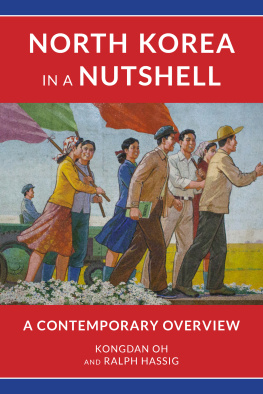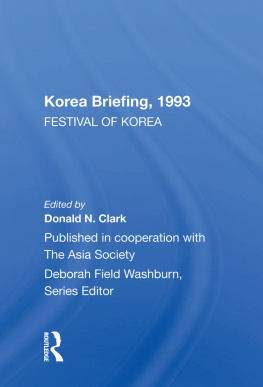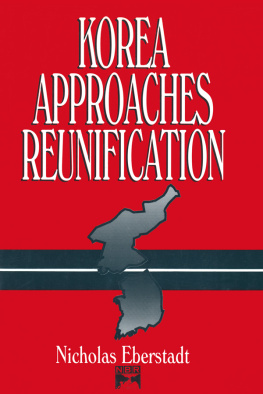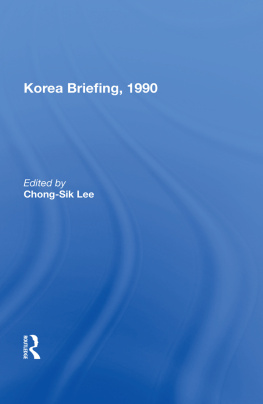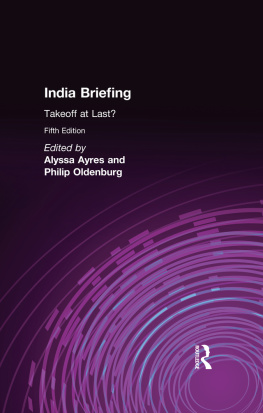KOREA BRIEFING 1997-1999
The Asia Society is a nonprofit, nonpartisan public education organization dedicated to increasing American understanding of Asia and broadening the dialogue between Americans and Asians. Through its programs in policy and business, the fine and performing arts, and elementary and secondary education, the Society reaches audiences across the United States and works closely with colleagues in Asia.
The views expressed in this publication are those of the individual contributors.
KOREA BRIEFING 1997-1999
Challenges and Change at the Turn of the Century
Kongdan Oh
Editor
Published in cooperation with the Asia Society
Mai Shaikhanuar-Cota, Series Editor
An East Gate Book
First published 2000
by M.E. Sharpe
Published 2015
by Routledge
2 Park Square, Milton Park, Abingdon, Oxon OX14 4RN
711 Third Avenue, New York, NY 10017, USA
Routledge is an imprint of the Taylor & Francis Group, an informa business
Copyright 2000 Taylor & Francis. All rights reserved.
No part of this book may be reprinted or reproduced or utilised in any form or by any electronic, mechanical, or other means, now known or hereafter invented, including photocopying and recording, or in any information storage or retrieval system, without permission in writing from the publishers.
Notices
No responsibility is assumed by the publisher for any injury and/or damage to persons or property as a matter of products liability, negligence or otherwise, or from any use of operation of any methods, products, instructions or ideas contained in the material herein.
Practitioners and researchers must always rely on their own experience and knowledge in evaluating and using any information, methods, compounds, or experiments described herein. In using such information or methods they should be mindful of their own safety and the safety of others, including parties for whom they have a professional responsibility.
Product or corporate names may be trademarks or registered trademarks, and are used only for identification and explanation without intent to infringe.
Library of Congress ISSN: 1053-4806
ISBN 0-7656-0610-0 (hardcover)
ISBN 0-7656-0611-9 (softcover)
ISBN 13: 9780765606112 (pbk)
ISBN 13: 9780765606105 (hbk)
Contents
| Doowon Lee |
| Byung-Kook Kim |
| Gi-Wook Shin and Kyung-Sup Chang |
| Youngna Kim |
| Young Whan Kihl |
| Hong Nack Kim |
Korea Briefing: Challenges and Change at the Turn of the Century discusses major events in South Korea that occur in the years 1997, 1998, and early 1999. It focuses on the impact of the Asian financial crisis that began with the summer of 1997 and the subsequent surprise election of Kim Dae-Jung to the presidency later that year. In addition, this book discusses South Korea's ties with the world under the current presidency, the present and future of Korean arts and culture, and relations between North and South Korea.
Chapter authors are specialists from the disciplines of economics, art history, political science, sociology, and international relations. They present perspectives on Korea that are tightly argued and insightful. An inspiring picture of Korea emerges from this volume. Despite suffering the effects of the regional economic crisis, Korea moved swiftly toward recovery while at the same time strengthening its democracy and maintaining stable relations with the world.
The Asia Society would like to thank the editor, Kongdan (Katy) Oh, for skillfully bringing together a team of authors who were relentless in perfecting their chapters for publication. We are grateful to these authors who worked swiftly to meet our stringent deadlines. Mai Shaikhanuar-Cota, the publications manager at the Asia Society, labored tirelessly to bring this book to print. Peter Smith and Patricia Farr assisted in the behind-the-scenes production of this book. Many thanks to Doug Merwin, Angela Piliouras, and Patricia Loo, our colleagues at M.E. Sharpe, who continue to support our country briefings. Gratitude is also due to The Korea Society for allowing us to use their materials for the chronology that appears at the end of this volume. Most important, we also thank the Korea Foundation, without whose support and generosity this volume would not have been possible.
Marshall M. Bouton
Executive Vice President
Asia Society

My sincere thanks to the seven contributing authors of this volume. I selected them as leading experts in their respective fields based on their reputations, my own professional dealings with them, and the recommendations of their peers. They were all cordial, cooperative, sincere, and punctual in delivering their chapters on a tight schedule. My thanks also to the Asia Society's editor of this book, Mai Shaikhanuar-Cota, who displayed humor, sensitivity, and interest throughout the project. As a fellow cat lover, she comforted me when I lost my little morale-boosting companion while editing this book. I also want to thank my husband and lifetime research partner, Ralph C. Hassig, who assisted me at every step of the editorial process. And thanks finally to David McCann, editor of the previous edition of Korea Briefing, who recommended me as his successor, thus providing me with the opportunity to work with these fine people. I hope I have been able to uphold the high standards that he and the other editors of the Korea Briefing have set, striving to make this an authoritative, informative, and readable source of knowledge for students of Korea.
Kongdan Oh
KOREA BRIEFING 1997-1999
Kongdan Oh
The Republic of Korea (ROK, or South Korea), a nation that in only a few decades rose from poverty to membership in the Organization for Economic Cooperation and Development (OECD) group of wealthy nations and from military dictatorship to democracyall the while standing on the front line of the Cold Warhas seen few dull moments in its modern history. The years 1997 to mid-1999, covered in this sixth edition of Korea Briefing, proved to be no exception. The two almost simultaneous events framing Korean life in this period were the government's agreement to accept a financial rescue package and economic guidance from the International Monetary Fund on December 3, 1997, and the election of the opposition-party candidate Kim Dae-Jung to the presidency on December 18, 1997.
How Koreans responded to the financial crisis under the leadership of their new president is the theme of this book. The short-term impacts of these events are still unfolding; the long-term effects will be felt for years to come as Korea once again lifts itself up, dusts itself off, and prepares to meet the challenges of the twenty-first century.


